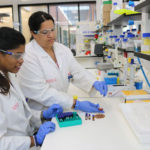Australia could fare worse than China in the virus outbreak

Australia could see higher proportional death rates from the novel coronavirus outbreak than in China, due to our relatively older population and the more severe symptoms of the virus in older people, according to a perspective penned by one of the world’s leading biosecurity experts.
The warning follows the outbreak of coronavirus (COVID-19) infection in a Sydney aged care facility and the death of one resident who tested positive for the virus.
Writing in the latest issue of the journal Public Health Research & Practice, published by the Sax Institute, Professor Raina MacIntyre, who heads the Biosecurity Program at the Kirby Institute, UNSW Sydney, says the possibility of a proportionally greater morbidity and mortality impact in Australia means that we should persist with all feasible prevention measures for as long as possible.
Travel restrictions and quarantines are proven interventions for disease control, Professor MacIntyre says, but travel bans are not sustainable indefinitely because of our close economic ties with China.
“Countries everywhere will have to make choices between the economic and public health consequences of COVID-19,” she writes.
Professor MacIntyre’s wide-ranging perspective looks at the likely impacts of novel coronavirus disease in Australia and elsewhere, and is informed by a rigorous training simulation for a pandemic in Sydney she undertook with colleagues in 2018.
She points to cruise ships as a “weak link” that could lead to sustained community transmission of the deadly infection in Australia and elsewhere. A cruise ship berthed in Sydney Harbour with 500 cases of novel coronavirus (COVID-19) infection would “immediately stress our health system” and any prolonged epidemic could rapidly exhaust our capacity for ICU and isolation beds, as well as stocks of personal protective equipment and other supplies.
“Advice to Australians to avoid cruises in the Asia-Western Pacific region at this time may be prudent,” she writes.
Once travel bans are lifted, we need to be prepared for a potential surge of cases worldwide, Professor MacIntyre says, with schools, universities, sports and entertainment venues being sites of more intense transmission. We may need to plan for alternative sites for contact quarantine and the use of community volunteers.
New Australian cases of infection in people with no travel history or known contact with a carrier suggests we may have entered a period of sustained community transmission of COVID-19. Cases are occurring where people have the virus but are not showing symptoms – and they may be just as likely to spread the infection as people with disease symptoms.
A high ratio of deaths to cases in Iran and Italy suggests a substantial proportion of undiagnosed cases and community transmission, and in Japan researchers estimate that more than 90% of cases are undetected.
Open Forum is a policy discussion website produced by Global Access Partners – Australia’s Institute for Active Policy. We welcome contributions and invite you to submit a blog to the editor and follow us on Facebook, Linkedin and Mastadon.















